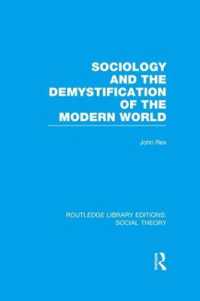- ホーム
- > 洋書
- > ドイツ書
- > Social Sciences, Jurisprudence & Economy
- > Politics, Society, Work
- > social science
Full Description
This brief examines the ways in which sociocultural characteristics and contexts intersect to create varying dimensions of social advantage and inequality that, in turn, affect and organize professional relationships in educational and therapeutic settings. It explores how inherently hierarchical relationships develop within educational and university contexts, including between professors and students, supervisors and supervisees, clinicians and clients, and administrators and faculty members. The volume addresses how participants' social locations inform their roles and actions and how they can hold positions of power while also embodying a marginalized identities.In addition, the book draws on perspectives of persons marginalized or privileged based on their race/ethnicity, sexual orientation, and/or gender to examine how social location impacts their work as family therapy clinicians, supervisors, instructors, and administrators. Grounded in individual reflection and detailed experiences, each chapter describes rich personal narrative on how the individual therapist's intersecting social locations influence his/her professional relationships. This book highlights the need for family therapists to identify their social location characteristics, evaluate the impact of their social location on their professional relationships, and process the role social location has on their academic, supervisory and clinical position. This volume is an essential resource for clinicians and practitioners, researchers and professors, and graduate students in family studies, clinical psychology, and public health as well as all interrelated disciplines.
Contents
Chapter 1. An Asian Woman Leading a Graduate MFT Program in the United States.- Chapter 2. Processing Social Location as a Taiwanese-American Male in Academia and Clinical Training.- Chapter 3. Deconstructing the Supervisory Dyad: The Voice of a Taiwanese/Chinese Female Postmodern Supervisor.- Chapter 4. The Unlikely Professor: A Black, First-Generation, Cis-Gender Female in Higher Education.- Chapter 5. Negotiating Two Feet in Multiple Worlds: A South Asian American Woman in Family Therapy Education.- Chapter 6. Power on the Margins: Navigating the Program Director Role as an Asian, Queer, Immigrant Woman in Canada.- Chapter 7. Impacts on the Classroom Environment: The Perspective from a U.S. Born Latino-Male Religious Minority Faculty.- Chapter 8. A White Ally Navigating Unjust Training Systems.- Chapter 9. The Mosaic of Social Location from MFT Faculty: Piecing the Stories Together.








